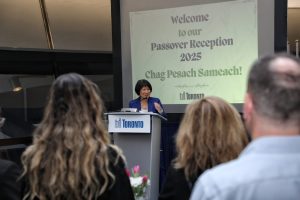 TORONTO — A new Canadian government under Liberal party rule would work harder than the current Conservative administration to bring peace to the Middle East, Bob Rae, the party’s foreign affairs critic, said last week.
TORONTO — A new Canadian government under Liberal party rule would work harder than the current Conservative administration to bring peace to the Middle East, Bob Rae, the party’s foreign affairs critic, said last week.
Bob Rae
“We would be more active in working with all the nations of the Middle East to create the conditions for a peaceful resolution of the Arab-Israeli conflict,” he pledged in an interview. “Supporting Israel doesn’t mean you become indifferent to trying to find a way to peace.”
Sounding an upbeat note, Rae – the MP for the ethnically diverse riding of Toronto Centre – said Israel’s long-running dispute with the Palestinians can and should be settled by diplomatic means.
“It’s a difficult conflict, but it’s important to resolve it,” said Rae, who is due to receive an honorary doctor of philosophy degree from the University of Haifa at a dinner in Toronto on Nov. 7 sponsored by Canadian Friends of Haifa University.
He added, “Many long-standing disputes have been resolved. While it may seem unattainable at times, history shows us that breakthroughs can happen.”
The former NDP premier of Ontario, Rae plans to visit the Mideast later this month, stopping in Israel, the Palestinian areas in the West Bank, Jordan and Egypt. By his count, it will be his 10th visit to Israel since the early 1990s.
Speaking in his constituency office in Cabbagetown, Rae, an advocate of a two-state solution, took questions on a wide variety of Middle Eastern problems.
Taking issue with the perception that Prime Minister Stephen Harper’s government has been more pro-Israel than previous Canadian governments, he said, “I don’t think that’s true. No party has a monopoly on its commitment to Israel’s security within recognized international borders.”
Rae, claiming that Harper’s foreign policy is based too much on “partisan advantage,” said he has failed to recognize that Canada has a national interest in defusing the Arab-Israeli conflict.
Professing to be unconcerned about the perception that Jews in Canada have begun to rethink their traditional support of the Liberal party, Rae suggested that Canada’s relationship with Israel is not the only issue on their agenda.
“All voters, regardless of background, will vote on the basis of various issues. It’s an oversimplification that there is only one issue.”
“We, as a national party, have to appeal to the whole electorate,” he noted.
The Liberal party, Rae went on to say, has “a long-standing connection” with the Jewish community and hews to a “principled” position that takes Israel’s security needs into account.
He downplayed media speculation that Canada’s failure to win a non-permanent seat on the United Nation’s Security Council last week was partially a function of its increasingly unflinching pro-Israel stance.
“Not really,” he said. “Canada has always consistently supported Israel.”
His own personal support for Israel, he observed, hinges on his understanding of its need for peace and security.
Asked whether he has policy differences with Israel’s current right-of-centre government, Rae replied, “It’s not a personal issue. Canada has taken a consistent position since 1967. We don’t regard settlement activity [in the territories] as conducive to peace. Nor does it advance the cause of Israel’s security.”
A peace agreement between Israel and the Palestinians should include two major provisions – mutually recognized borders and self-determination for the Palestinians.
As he put it, “There has to be a recognition of borders and boundaries and of the legitimate aspirations of the Palestinian people to have a country of their own.”
Coming out in favour of an extension of Israel’s partial moratorium on construction in the West Bank, Rae said, “It was a statesman-like gesture, and something like it again would be helpful to get the parties back to the negotiating table. Getting back to the table is important.”
Sizing up Israeli Prime Minister Benjamin Netanyahu’s commitment to peace, Rae said, “He is sincere about wanting peace. He has a keen sense of Israel’s long-term security interests.”
Rae said he hopes to meet Netanyahu when he travels to Israel at the end of this month.
Asked for his appraisal of Palestinian Authority President Mahmoud Abbas, whom he has met, he said, “He’s committed to mutual recognition, a two-state solution and negotiations. He’s a man who has to be talked to.”
When he was asked whether Israel should withdraw to the pre-1967 lines to achieve peace with the Palestinians, Rae said this pivotal issue should be settled in bilateral talks, adding that border adjustments should be the outcome of mutual agreement.
Likewise, he said, Israel’s demand for Palestinian recognition of its status as a Jewish state should be hammered out in talks.
Rae would not be drawn into a discussion on whether Israel, as claimed by the United Nations’ Goldstone commission, committed war crimes during its invasion of the Gaza Strip last year. “Goldstone’s report is not determinative of that issue, and I’ll leave it at that.”
He was also careful in answering a question about allegations that Israel used disproportionate force in the Gaza war.
“Israel’s motivations in entering Gaza were based on a profound sense that attacks from bases in Gaza were continuing,” he said in a reference to Palestinian rocket barrages. “Those motivations are completely understandable.”
What has to be assessed, he said, is what impact Israel’s military response had on Gaza’s civilian population.
As for Israel’s siege of Gaza, Rae offered a two-pronged answer. “The human needs of Gaza have to be recognized and conditions in Gaza have to be improved, as they have been. But it’s entirely legitimate that Israel is concerned about its security.”
Rae suggested that Hamas – which has been in control of Gaza since June 2007 – cannot be part of any peace process unless it recognizes Israel’s existence and disavows violence.






